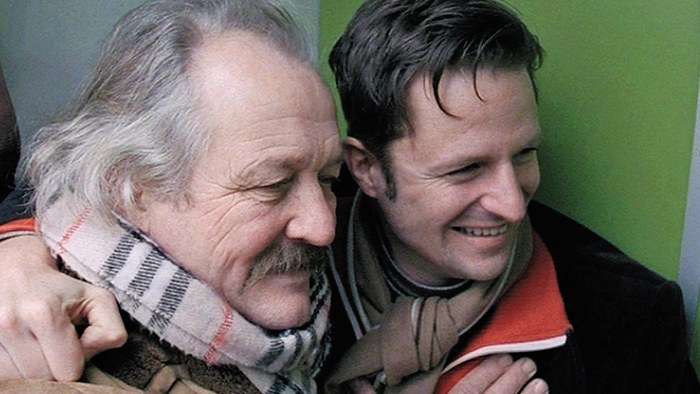 WALTER SAABEL AND PHILIPP HOCHMAIR IN THE SHINE OF DAYTwo contrasting characters in search of a plot
WALTER SAABEL AND PHILIPP HOCHMAIR IN THE SHINE OF DAYTwo contrasting characters in search of a plotTizza Covi and Rainer Frimmel are now becoming known in the film festival world for their semi-fictional, semi-documentary films focused on circus performers. I saw their 2010 debut feature
La Pivellina ("Little Girl," ND/NF, also SFIFF), though it seemed too desultory an effort for me to write about. This new one has more warmth and momentum, though exactly what the point of it all is seems harder to say. The focus is on two relatives, a famous and highly active stage actor (wiry, hyper 39-year-old Philipp Hochmair) , and his uncle (bewhiskered, mellow 62-year-old Walter Saabel), a vagabond carnival performer, especially with performing bears, who turns up unexpectedly and latches onto his nephew for a while, first in Hamburg and then in Vienna. We get a chance to compare the two men's lifestyles and world views, and the uncle comes to play a helpful role both to the actor and his harried Moldavian neighbor. Then events drift off, with a the success of a major project left dangling. But along the way the interactions of the two men, if making for as desultory a story as the of La Pivellina, provide engaging duo personality studies. The two men are playing ore or less themselves, except that they are not really related, and the specific events of the film are invented for the film.
It's an intentional part of the way he is depicted, or depicts himself, that Philipp is almost never "himself," if he even
has a self -- a point dramatized by having him made up in character as a bald man when Walter first finds him. Philipp freely admits he revels in acting as if it were a compulsion and an addiction, as well as a way of releasing his "rage," which he points out Walter admits he has a store of he'd like to release. Outdoors, indoors, for children, for adults, and in various cities Philipp rushes around, playing everything from Mephisto to Woyzeck to a children's fairy tale, with little time for friendship and just the occasional liaison. Walter, who was once married (and says that's "a beautiful experience of life") was a performer in Italy, especially throwing daggers and dancing and wrestling with bears, but he is as laid back as Philipp is driven, living from day to day, missing the first rehearsal Philipp invites him to because he gets involved drinking and having fun in a bar.
Philipp is sometimes taxed with having to learn many challenging new parts rapidly; in this, Walter, who has turned up after Philip shifts back to his home town, turns out to be helpful as a prompter or corrector. Meanwhile Victor, Philipp's Moldavian neighbor, a non-citizen carpenter, has been left with the care of his little boy and girl since his wife went back to see her mother and was barred from returning to Germany, so Walter steps in and begins babysitting for the kids nearly full-time. Obviously Walter is cast as the good guy, and Philipp as the workaholic, though the two men have an affinity as artists that is contrasted with Philipp's unseen father, a businessman later revealed to be only Walter's half-brother, not his brother -- as if this were an afterthought of the writers, when it became clear how different Walter was from the other man. On the other hand because he is so driven and competitive, Phlipp can be seen as the artistic offspring of an executive.
There's time for some mockery of Philipp's pretensions when he's given a sculptor's larger-than-life portrait in the form of a wall plaque that will go up in a main theater of Hamburg, and Walter, unimpressed, uses it for knife-throwing practice. The two men clash more than once, but they also cooperate, Walter seeming to serve as a more simpatico second father for the younger man.
Unfortunately though there is more energy and momentum and a neater central contrast here than in
La Pivellina, many scenes have no other purpose than to round out the two contrasting personalities and it seems odd, yet perhaps somehow typical of Covi and Frimmel, that when Walter is embarking on a trip to clandestinely retrieve Victor's wife from Moldavia, the film abruptly ends. It is never clear all along the way where any of this is headed, and as soon as the film finds a goal, it stops. Defenders of the fiction-nonfiction blend Covi and Frimmel represent might insist the aim is to capture life, where all is a muddle. But muddles have a way of making for pretty ho-hum films, which is a pity in view of how lifelike and appealing Walter's and Philipp's are at playing themselves.
Der Glanz des Tages , 90 mins., debuted at Locarno, where Walter Saabel got the Best Actor award and the directing duo were nominated for the Golden Leopard for Best Director. It was shown at several other festivals, and was screened for this review as part of the FSLC-MoMA joint series New Directors/New Films in New York in March 2013.





